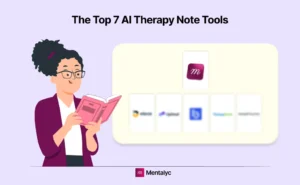Writing notes can be time-consuming and daunting if you’re a mental health professional. If you have Dyslexia, this process may be even more difficult and time consuming, as this condition can cause many frustrations.
For many people, Dyslexia may cause difficulty with tasks related to writing and reading. Ensuring your notes are correct and high quality can be tricky because Dyslexia is a learning disability that affects language.
Fortunately, some tools can help, from grammar and spell-check software to AI tools that write your therapy notes for you; there is something that can make writing your notes more manageable. In addition, mental health professionals can benefit from using assistive tools if they have Dyslexia and may also be able to help provide resources for clients with similar conditions.
What is Dyslexia?
Dyslexia is considered a neurodevelopmental disorder and occurs when there are difficulties in the accuracy and speed of decoding words. Individuals with Dyslexia have trouble with language, including decoding terms or figuring out sounds associated with letters or words.

New! Transfer your notes to EHR with a single click. No more copy-pasting.
Some common symptoms of Dyslexia include:
- Trouble with recognizing unfamiliar words
- Difficulties with reading fluency
- Challenges with spelling words
- Labored or inaccurate oral reading
- Trouble writing words
- Difficulties with reading comprehension
- Problems with learning letter names and the sounds of letters
- Trouble reading single words in isolation
- Trouble with working memory
- Reversing letters in a word
- Difficulty with organization
While these symptoms may not affect all people with Dyslexia, these symptoms are commonly associated with the condition. Dyslexia is typically diagnosed in children, though it can cause problems into adulthood. It is also a genetic condition, and you’re more likely to have Dyslexia if another close family member has it.
According to the International Dyslexia Association, the brains of individuals with Dyslexia are wired differently, and there isn’t a link between Dyslexia and intelligence. People with Dyslexia are not more or less intelligent than people without the condition.
Dyslexia doesn’t have a cure. Individuals with Dyslexia need to learn appropriate coping strategies to help them address barriers caused by the disability. Dyslexia is also associated with Attention Deficit Hyperactivity Disorder (ADHD).
Read: ADHD and Progress Notes: Strategies and Tools for Therapists
How can Dyslexia affect mental health professionals who take notes?
If you’re a mental health professional with Dyslexia, note-taking and documentation may feel overwhelming. Not only do you have to proofread notes, but listening during a psychotherapy session and trying to jot down notes simultaneously may feel like a nightmare.
Additionally, even when you’re trying to recall all the details from a session and write a note afterward, it can be unclear to get ahold of your thoughts and write a note. You may have problems reading back what you wrote.
You may reverse letters or spell words wrong. Your brain may have difficulty summarizing the session into a comprehensive progress note. Mental health professionals know that a plethora of information must be included in intake notes, progress notes, and discharge notes. If you can’t summarize and demonstrate medical necessity, you may experience a rough time if you get audited by an insurance company.
With intake notes, summarizing information, gathering all relevant details to the client’s treatment, and gathering a thorough history can be tricky when you’re with a client.
Progress notes also help clinicians keep track of relevant information about their clients and help you track your client’s progress from session to session. Writing strong quality progress notes is essential, but it’s hard to figure out a better way when you get behind or have limitations that make notes challenging.
Because people with Dyslexia also have difficulty with reading comprehension and processing speed, it may take a while to read your notes back and check them for errors. This can be a potential barrier to someone with Dyslexia writing high-quality progress notes.
Research on Dyslexia indicates the importance of fast and accurate reading skills to succeed professionally in today’s society. Unfortunately, people with Dyslexia often have deficits in reading speed and read at a slower rate than those without Dyslexia, making it tough to review notes between sessions quickly and to read notes to ensure accurate comprehension.
Luckily, there are many assistive tools and strategies for writing notes that can be helpful. You can use these tools to help you write notes in the best format for you.
What tools can I use to write notes if I have Dyslexia?
If you have Dyslexia and are a mental health professional, there are many tools available you can use. Tools can make your note-taking process error-free and help you summarize information. For example, it can be overwhelming to remember all the points needed in your progress notes to document medical necessity, and using assistive tools can help provide you with high-quality notes.
Proofreading and Grammar-Checkers
You can use proofreading and grammar-checking software to help you ensure your notes are high-quality and free of spelling and grammatical errors.
Some popular tools include:
- Grammarly– A cloud-based assistant that reviews your text for clarity, ease of reading, grammar, delivery, plagiarism, spell-check, and punctuation errors. Grammarly suggests revisions and edits that can improve your text.
- ProWritingAid -An editing and proofreading software that detects plagiarism, fixes grammar, and reviews your writing’s syntax, structure, and style. In addition, it is an overall editor that offers writing assistance and suggestions.
- Hemingway Editor – An editing software that helps you fix complex sentences, sentence structure, and common writing errors. It also offers spell-check.
Each of these tools can be helpful for a mental health professional with Dyslexia.
Voice-to-text Dictation
For an individual with Dyslexia, voice-to-text options may be more appealing than typing. For example, voice-to-text dictation software can help you say what you need to without typing it out. One downside of this type of software is that it can be challenging to avoid spelling, punctuation, or grammatical errors; however, if you pair it with grammar or spell-check software, these programs can help your note-writing process tremendously.
Some popular dictation software includes:
- Dragon – A paid dictation service allows you to dictate notes or other forms of writing three times faster than typing.
- Google Docs voice typing – A free to use voice text service when creating documents in google docs.
- Apple Dictation -A free to use dictation software that is on all Mac devices.
- Braina -A personal assistant dictation service that works on Windows. It can be used to dictate in over 100 different languages.
Most people can talk faster than they can type, so this software can help you save time with your documentation and make it easier to write your notes.
AI Note-Writing Tools
AI can write intake, progress notes, and many types of notes for you, saving you time and ensuring you’ve gathered all the relevant information from your session.
Mentalyc AI writes your progress notes for you in under 2-minutes. It works by recording your psychotherapy sessions for you. You set up what note format you want to use, and Mentalyc does the rest of the work. Mentalyc offers client consent forms and is HIPAA-compliant.
As one of our users Tiffany who has Dyslexia, stated:
“For a person with Dyslexia, it saves on writing out a lot of material as well as second-guessing yourself because we tend to make a lot of common errors along the way. Also, it takes out the worry you go through when writing notes.”
Many of our users have stated that Mentalyc is easy to use and set up, and you can format it to your needs with a few clicks of a button.
If you’re interested in quick progress notes that fit your practice needs, sign up for a free trial of Mentalyc today.
While other AI tools can help you write notes, not all programs are HIPAA-compliant. For example, ChatGPT has quickly gained popularity as an AI tool; however, writing progress notes on there would have ethical implications due to the lack of HIPAA compliance. Mental health clinicians have an ethical duty to do no harm, and protecting your clients’ confidentiality is of utmost priority.
If you choose to use AI tools in your psychotherapy sessions, please remember to have your clients sign consent forms and look into the HIPAA-compliance aspect of using such tools before trying them out.
The Bottom Line
The most common symptoms of Dyslexia include trouble sounding out words and reading comprehension. While there are varying definitions of Dyslexia in the research, it causes many barriers to those experiencing it. If you’re a mental health clinician, this can create specific challenges with the documentation of client sessions.
People with Dyslexia have difficulty with language. Typing, reading, and writing can all be a hassle and a daily life barrier. Luckily various tools can make things easier for a person with Dyslexia. AI tools, grammar checkers, and voice-to-text software are all options that can help you write progress notes and other forms of documentation.
References:
- Hulme C, et al. (2016). Reading disorders and Dyslexia. https://journals.lww.com/co-pediatrics/fulltext/2016/12000/reading_disorders_and_dyslexia.11.aspx
- Franzen L, et al. (2021). Individuals with Dyslexia use a different visual sampling strategy to read text. https://www.ncbi.nlm.nih.gov/pmc/articles/PMC7979812/
Why other mental health professionals love Mentalyc

“It’s so quick and easy to do notes now … I used to stay late two hours to finish my notes. Now it’s a breeze.”
Licensed Professional Counselor

“Having Mentalyc take away some of the work from me has allowed me to be more present when I’m in session with clients … it took a lot of pressure off.”
LPC

“A lot of my clients love the functionality where I can send them a summary of what we addressed during the session, and they find it very helpful and enlightening.”
Therapist

“It takes me less than 5 minutes to complete notes … it’s a huge time saver, a huge stress reliever.”
Licensed Marriage and Family Therapist






